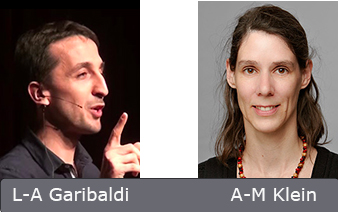
- This event has passed.
Dr. Lucas Alejandro Garibaldi & Prof. Dr. Alexandra-Maria Klein : Wild pollinators and honey bees in pollinator-friendly agricultural landscapes

18:00 – 20:15 (Geneva – Zurich)
For other time zones use this time zone converter ( link )
Pollinator diversity is being lost at an alarming rate. One of the main causes of this loss is the land-use change caused by the expansion of conventional agriculture and livestock production. Management practices such as monocultures and the intensive use of agrochemicals reduce the number of species of plants, birds, bees and other taxonomic groups, and increase, at the same time, the relative abundance (dominance) of one or a few cultivated and wild (e.g., weed) species. Given that ~40% of the terrestrial surface is occupied by crop and livestock lands, it is critical to increase food production without destroying pollinator diversity. In addition to the value given by its ethical and spiritual dimensions, and the potential use of future generations.
Alexandra Klein will initially introduce why pollinator diversity is important to pollinate the food we are eating and give us a brief impression about the wonderful and much needed diversity of bees.
Lucas Garibaldi will show how conventional (industrial) agriculture is reducing pollinator diversity and present actions that producers, consumers, politicians and scientists can take to restore pollinator diversity. For example, producers can implement management practices in- and outside the crop fields to increase floral and nesting resources, and therefore pollinator abundance and diversity. In addition, consumers can modify diets, reduce waste and produce food at small scales, among many other actions.
Lucas and Alexandra will jointly conclude that one single strategy will not be enough to solve the dilemma of producing food and preserving biodiversity. To maintain pollinator diversity and their critical services we need a holistic approach engaging the whole society as we are close to tipping points when functions/services will collapse.
Dr. Lucas Alejandro Garibaldi : How honey bees and wild pollinators benefit from well-thought-out agricultural landscapes
Lucas Garibaldi is a professor at the National University of Río Negro (UNRN) and director of the Research Institute on Natural Resources, Agroecology and Rural Development (IRNAD – UNRN). He studied Agronomical Engineering at the University of Buenos Aires (UBA), specialized in Ecology and moved to Bariloche once he obtained his degree. When he started his career as a scientist, he sought to work with issues that were underexplored. His work focuses on finding new ways to produce food without destroying the environment and encouraging biodiversity. He was recently awarded the Incentive Award of the Bunge y Born Foundation for his contributions to the field of Ecology. He has also received the Houssay Award in 2007 for his contribution on Environmental Sciences and Technologies, and the Incentive Award of the National Academy of Exact, Physical and Natural Sciences in 2015.
Affiliation : National University of Río Negro (UNRN); Research Institute on Natural Resources, Agroecology and Rural Development (IRNAD – UNRN)
Publication ( link )
Prof. Dr. Alexandra-Maria Klein: Bees, pesticides and flower resources: research in semi-field experiments
Alexandra-Maria Klein is the chair for Nature Conservation and Landscape Ecology at the University of Freiburg in Germany. Her main research focuses on biodiversity and ecosystem functions mediated by macro-organisms e.g. pollination, herbivory, seed dispersal, seed predation and parasitism of insects and started with research on the importance of insect pollination for coffee in Indonesia in 1998. She aims to understand the effects of global environmental changes and uncertainties on the relationship between biodiversity and ecosystem functions.
Affiliation : Nature Conservation and Landscape Ecology at the University of Freiburg in Germany
Publication ( link )
To attend this conference, please buy a ticket.
You decide how much you would like to pay for a ticket for the online conference. The price of a ticket to help cover the costs of the online conference is 39 Swiss Francs (CHF 39). We encourage you to make a larger financial contribution, if you can, to support financing the future events and the conservation and safeguarding of wild-living honey bees.
You will receive a link on Zoom in good time before the conference.
